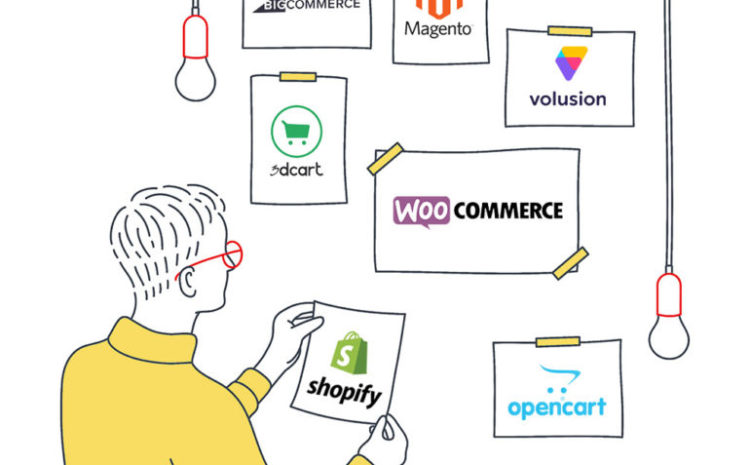Which eCommerce platform suits your business?
Building a successful online business starts with choosing the best eCommerce platform for your brand. eCommerce platforms let you build your very own online store with minimal coding skills, and a lower budget. They come packed with eCommerce-specific designs and features to make setting up your business as easy – and successful – as possible. Using any of these existing platforms helps you go online within a week.
There are so many eCommerce platforms available, choosing one can get pretty sticky – especially when they all claim to be the best.
Here are our top 8 eCommerce platform shortlists
Best eCommerce Platforms:
- Wix – best all-around eCommerce platform.
- Shopify – best eCommerce platform for large stores, selling 10+ products.
- BigCommerce – best for large and fast-growing businesses.
- Squarespace – best for high quality templates and aesthetic storefronts.
- Square Online – best value for money.
- Weebly – the one to watch.
- Volusion – excellent analytics features.
- GoDaddy – best for beginners.
While Wix is the best overall choice – it’s extremely beginner-friendly and has excellent eCommerce tools, Shopify is the best option for larger stores selling a range of products, BigCommerce is ideal for fast-growing stores, Squarespace has the best-looking designs, Square Online and Weebly are two sides of an easy-to-use coin, while Volusion and GoDaddy are less well-rounded, but have great benefits to offer for business.
The cost of eCommerce platforms vary with non-eCommerce specific platforms, like Wix, Weebly and Squarespace, starting from $8/month and for enterprises who prefer the top of the line product with Shopify or Bigcommerce, priced at $299/month and $249.95/month respectively. This is apart from the template and one time customization you want to work on.
Coming to the most critical question, What can the best eCommerce platforms do for you?
Keep these factors in mind, before you select the right platform:
- Manage your sales channels (integratable- social media accounts)
- Create new marketing material
- Update order and shipment status
- Manage your stock inventory
- Analyze your sales reports
- Handle taxes and invoicing
The catch here is, if you need to validate all of this, you won’t have any time left to focus on growing your online business. On board an expert who can understand your requirement, shortlist your platform based on market, budget and objective.

So how do you choose from our shortlist of top eCommerce platforms? To find the right platform, you need to think about things like ease of use, apps and extensions, and how far you want to grow your store.
Check if the platform meets your requirement for
- Mobile optimization
- Ease of use
- Scalability
- Payment options
- Apps and add-ons
Mobile Optimized: How many different devices can you browse the internet on in your household? By 2021, mobile could make up to 72.9% of eCommerce sales – up from just 11.6% in 2014. How well your store adapts when people look at it on different devices (think smartphone, tablet, laptop) with different screen sizes defines user experience and entices the customer to come back and shop. A bad UI will put off the customer and they would never return to your store.
Ease of Use: Whether you’re just starting out selling online, or getting your bricks-and-mortar business online for the first time, ease of use is critical. The best eCommerce platform dashboards are simple to use and understand and show basic stats and suggestions for improvement. Adding features, colors, fonts and functionality that you want on your store are relatively easier and standardized.
Scalability: Look for a platform where you can grow in long term, as it is a herculean task to re-develop website on another platform in a few years. You will spend more time on your website than your core business.
Check the following factors while evaluating:
- Your store can handle the extra number of shoppers without slowing down or crashing
- You have the flexibility to make changes as your business goals change
- If you can add more products, collections, categories as you expand your range
- You can be confident your store has the right security certificates to sell online
Extensions and Apps: The best eCommerce platforms, such as Shopify and BigCommerce, have marketplaces where you can pick and choose additional functions which can be plugged in to your store. These are typically one time purchase or SaaS models where you pay monthly based on fixed amount or usage.
There are a number of categories of functions that you can add to your online store, including:
- Sales & Marketing
- Shipping / Fulfillment
- Inventory / Order Management
- Customer Service
- Accounting
- Reporting / Analytics
Look for the extensions and apps which the platform supports, this will indirectly help you in CRM and scale your business tooth value add features like auto mailers, auto sms, abandoned cart reminders etc.
Payment Options: The best eCommerce platforms provide a range of payment options, including:
- PayPal
- Credit Card – Visa, Master Card, Diners, Amex or Debit Card
- Debit Card
- Amazon Pay
- UPI Platforms
- EMI / Online Banking
The more options you can give your shoppers, the more chance you have of making a sale.
There’s no magical answer that’s perfect for everyone. Your objective, product, market and scalability for your brand will help you determine the best platform for your business. Having a tech support team helps in managing your requirement, analysing the best platform and implementing the website in the shortest duration for a faster go-live and online sales.


